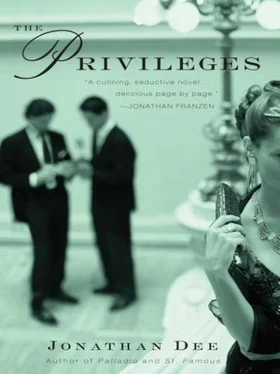“Just me. I just wasn’t sure what you liked, so I got a sampling.”
“A what?” Novak said. He scowled. “You’re here to steal from me.”
“No. Absolutely not. Like I said on the phone, I’m kind of a fan of yours. I went to a fair in Chicago and some of your drawings were hanging on the wall there. I thought they were really beautiful. Did you know that people as far away as Chicago think you’re a great artist?” He could hear himself talking as if Novak were a child, but how else was he supposed to handle it? How did you know what aspect of him you were speaking to?
“You don’t know what you’re talking about,” Novak said.
“I will pay you a lot of money for your art, if you’re willing to sell it. But I’m not going to steal anything from you. I promise. Why, do you think other people have been stealing from you?”
“Do you think other people have been stealing from you?” Novak repeated, licking his fingers.
“Like your brother, maybe?”
“Like your brother, maybe?”
He said these things that seemed sarcastic or childish or angry but the tone of his voice didn’t really change significantly, nor did the look on his face. The sandwich got the lion’s share of his attention. He wore glasses with clear plastic frames, and what hair he had was so fair as to be almost invisible, like a baby’s hair; his pale skin was still touched by acne. Most remarkably, though Jonas was uncomfortable even noticing it, was that these features sat on a head that was so small he thought he could have palmed it like a cantaloupe. Novak put a handful of french fries in his mouth and then went over to the door and locked it.
“I don’t like other people seeing my drawings,” he said.
That’s what makes them so worth seeing, Jonas thought, but instead he said, “I can understand that. It’s private. What do you usually do with a drawing after you finish it?”
“I don’t know.”
“How often does your brother come to visit?”
“I don’t know.”
Jonas stopped trying to make eye contact with him; he felt the need to make his own presence less provocative somehow. As his eyes grew used to the overpowering lighting, he thought he picked something up from the walls themselves, something other than just the shocking white. He took a few steps forward and saw, or thought he saw, the ghost of a face.
“Do you draw on the walls sometimes?” he asked. Novak reacted as if he’d been poked, jumping up and walking toward the papered-over window, lacing his fingers on top of his head. “Only sometimes,” he said. “Not that much. She just painted again. She was really mad. I only do it if I’m out of paper and can’t go out, when I’m not feeling good.”
“When you’re not feeling good?” Jonas said. No reply. “Does drawing make you feel better?” No reply. He felt like he was burying himself deeper but he had to keep going until he hit on the right question to ask. “What makes you feel like doing it?” he said.
“I don’t know,” Novak said, pacing now.
The wall drawings were an interesting idea but Jonas’s first thought was that of course there would be no way to get them out of the apartment itself. Unless he came back with a camera. But right now it was hard to imagine Novak ever letting him back in here again. “Joseph,” he said, “you know, if you like, I would be happy to give you some more paper so you don’t run out. I could buy a lot of it for you. Is that something you’d like?”
“I don’t know,” Novak said.
“You don’t know? But then you could draw all you wanted, and you wouldn’t have to worry about her”—he didn’t know who he was referring to: Novak’s landlord, he assumed, unless it was his mother—“getting mad about the walls.”
“She said she’d throw me out,” Novak said.
“Right, so this way you could keep drawing and not have to worry about that. What do you like to draw with most?”
“Sharpies,” Novak said miserably. He stopped pacing in front of the papered-over window, with his back to Jonas.
“Sharpies cost money too, right? I could get you all of those you wanted. You could draw whenever you felt like it without getting into trouble. Wouldn’t you like that?”
“I don’t know,” he said.
It could have been the “I don’t know” of a three-year-old, just a conversation stopper; anyway, Jonas chose not to hear it. “Really?” he said. “Then why do you do it?”
“I don’t know,” Novak said, and turned around, and started walking forward; and Jonas, when he saw the expression on his face, took a step back toward where he thought the door was. “I don’t know I don’t know I don’t know I don’t know I don’t know.” Their eyes met, and for one incredible moment he knew they were wishing the exact same thing at the same time, which was that Jonas had never come here; and then Jonas started a little too casually toward Novak’s front door, but before he could figure which of the two locks to unlock, something hard, harder than a fist anyway, connected with the back of his head. He had never really been hit before, not ever, his whole life long. Everything went white, as if his eyes had rolled all the way around, and it couldn’t have been more than a few seconds later that he opened his eyes and was looking up at Novak sitting on a stool in the kitchenette, eating another one of the cold Arby’s sandwiches, and looking very worried.
Time, of course, would not stand still in the way Cynthia wished it to, and so eventually the door to the veranda opened and Irene came back squinting into the darkened room. The change in light was such that Irene didn’t seem to see her right away. Cynthia didn’t say anything for fear of waking her father, though she was unsure why, when she had rushed down here precisely because his death was imminent, she should now be placing such value on his sleep. Then Irene began gesturing with her thumb, like a hitchhiker, and Cynthia understood that she was suggesting the two of them go out into the hallway.
They shook hands. Cynthia put her age at about sixty; she appeared younger than that, but she had the look of a woman who was older than she looked. She smelled like cigarettes. Her hair had that sculpted sexagenarian appearance Cynthia had become familiar with through her time on the charity circuit. She was almost a head shorter too. Her skin was amazingly fair; how could you live in Florida, Cynthia wondered, and have skin that looked like that? Did she never go outside?
“Oh, I’m so excited to finally meet you,” Irene said. “Charlie talks about you all the time. He’s so proud of you and your husband, and all the success you’ve had.” Cynthia, with no similar civility to offer in return because she had had no notion of this person’s existence until a few days ago, smiled weakly. She could see already that Irene was the sort of woman who wore every emotion, no matter how fleeting, on her face, and so it became clear that she had been anticipating a more expansive Cynthia, as if there were already a bond there, as if this were a long-awaited reunion rather than a meeting of total strangers. “Anyway,” she said, “part of the reason I wanted to talk to you out of the room is that there are some things you may want to be prepared for before Charlie wakes up.”
“What is that?” Cynthia said. There was something about this moment, about Irene’s status as an intermediary between Cynthia and what was happening to her, about the spectacular presumption of her kindness, that was threatening to reveal itself as unbearable. Irene closed her big eyes, giving Cynthia a look at her horrifying blue eye shadow, and sighed.
“So at Charlie’s request they’ve taken him off every type of medication except pain management. One of the side effects of that is that his blood pressure has dropped so low that it’s affecting the blood flow to his brain, and so he’s showing some signs of dementia. Nothing big — sometimes he doesn’t know where he is, and sometimes he thinks he’s somewhere else — but he’s in and out of it, and it can be kind of scary, especially if you’re not expecting it. He’s been sick a long time but still, it’s happened so fast. Part of it is going off the medication but really it’s amazing how fast he slipped physically once he’d made the decision to let go. Amazing to me, at least. Marilyn says that it happens that way all the time.”
Читать дальше












